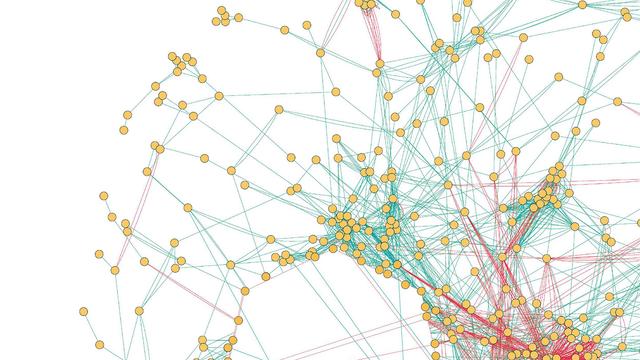💬 "Spending my springs and summers at EPFL doing research and then swimming in the lake or going for a hike was incredible! I’m also very grateful for how the EDIC program provided many opportunities for community building. I always felt valued and supported."
➡️ Learn how the EDIC PhD Program shapes researchers into pioneers of tomorrow’s breakthroughs: https://www.epfl.ch/education/phd/edic-computer-and-communication-sciences/
#EDICPhD #AI #SocialComputing #MachineLearning #WomenInSTEM #FutureResearchers #EPFL

EDIC - Computer and Communication Sciences
The Doctoral Program in Computer and Communication Sciences (EDIC) covers all areas of computer science and of information and communication theory. It spans across theoretical approaches to interdisciplinary applications of artificial intelligence, data science, computer systems, cybersecurity and visual computing. With roughly eighty faculty members across campus affiliated with the program, it is one of the largest and most competitive doctoral programs at EPFL.
Trust in tech is more than just code. New #CSCW2025 research uncovers how trust is built in Chinese NFT communities. The study finds that traditional Confucian values like "guanxi" (social connections) and "mianzi" (face) are crucial, shaping technological, institutional, and social trust.
This qualitative analysis of WeChat groups and interviews offers vital insights for designing trustworthy decentalized communities.
EasyHypergraph: an open-source software for fast and memory-saving analysis and learning of higher-order networks - Humanities and Social Sciences Communications
Higher-order relationships exist widely across different disciplines. In the realm of real-world systems, significant interactions involving multiple entities are common. The traditional pairwise modeling approach leads to the loss of important higher-order structures, while hypergraph is one of the most typical representations of higher-order relationships. To deeply explore the higher-order relationships, researchers and practitioners use hypergraph analysis to model the higher-order relationships and describe the important topological features in higher-order networks. At the same time, they carry out hypergraph learning studies to learn better node representations by designing hypergraph neural network models. However, existing hypergraph libraries still have the following research gaps. The first is that most of them are not able to support both hypergraph analysis and hypergraph learning, which negatively impacts the user experience. The second is that the existing libraries exhibit insufficient computational performance, which causes researchers and practitioners to spend more time and incur expensive resource costs. To fill these research gaps, we present EasyHypergraph, a comprehensive, computationally efficient, and storage-saving hypergraph computational library. To ensure comprehensiveness, EasyHypergraph designs data structures to support both hypergraph analysis and hypergraph learning. To ensure fast computation and efficient memory utilization, EasyHypergraph designs the computational workflow and demonstrates its effectiveness. Through experiments on five typical hypergraph datasets, EasyHypergraph saves at most 8470 s and 935 s over two baseline libraries in terms of analyzing node distance on a dataset with more than one hundred thousand nodes. For hypergraph learning, EasyHypergraph reduces HGNN training time by approximately 70.37% in a similar scenario. Finally, by conducting case studies for hypergraph analysis and learning, EasyHypergraph exhibits its usefulness in social science research.
Our next #HCIISeminarSeries guest is David Widder @davidthewid, postdoctoral fellow at Cornell Tech Digital Life Initiative (and
@scsatcmu.bsky.social
alumnus)! Join us.
🎙️AI Supply Chains: Tools to Locate Power & Responsibility in AI Production for Critical, Accountable Computing
📅Friday, January 31
🕜1:30-2:30pm
📍NSH 1305+livestream
🔗https://hcii.cmu.edu/news/event/2025/01/hcii-seminar-series-david-widder
#CarnegieMellon #ComputerScience #HumanComputerInteraction #CriticalComputing #SocialComputing #ResponsibleAI
HCII Seminar Series - David Widder | Human-Computer Interaction Institute
David Gray Widder (he/him) studies how people creating artificial intelligence systems think about the downstream harms their systems make possible, and the wider cultural, technical, and economic logics which shape these thoughts. He is currently a Postdoctoral Fellow at the Digital Life Initiative at Cornell Tech, an affiliate of the Data & Society research institute, and a research fellow of the European AI & Society Fund.
This Friday, our next #HCIISeminarSeries guest will be Amy Bruckman, Regents’ Professor, School of Interactive Computing at Georgia Institute of Technology. Join us!
🎙️ "The Crisis in 'Knowledge': What HCI Practitioners Need to Know, and What We Can Do"
📅 Friday, March 1
🕜 1:30pm
📍 NSH 1305 + livestream
🔗 Details: https://buff.ly/3uQEO86
HCII Seminar Series - Amy Bruckman | Human-Computer Interaction Institute
Amy Bruckman is Regents’ Professor in the School of Interactive Computing at the Georgia Institute of Technology. Her research focuses on social computing, with interests in online collaboration, CSCW, and content moderation. Bruckman received her Ph.D. from the MIT Media Lab in 1997, and a B.A. in physics from Harvard University in 1987. She is a Fellow of The ACM and a member of the SIGCHI Academy. She is the author of the book “Should You Believe Wikipedia? Online Communities and the Construction of Knowledge” (2022).
📣 Calling all #academics #scientists and #researchers of Mastodon. 👩🔬
Following on from my previous thread a few months back now (https://mastodonapp.uk/@jrashf/110205174439235868), why should social scientists and the wider research community be interested in Mastodon?
I'm thinking of putting together a research proposal and I would really appreciate your ideas.
Please consider boosting! 
#socialmedia #research #mastodon #fediverse #socialcomputing #socialnetwork #study
James Ashford (@jrashf@mastodonapp.uk)
Calling all #academics #scientists and #researchers of Mastodon. In the context of social media and the role of the Fediverse, what areas of research are poorly understood or under-researched? What are consider up-and-coming and novel? #socialmedia #research #mastodon #fediverse #socialcomputing #socialnetwork #study
A while back, Cory Doctorow had an article that made the rounds called “Tiktok’s Enshittification“, and then a follow-up called “Gig apps trap reverse centaurs in wage-stealing Skinner boxes“, both of which are well worth the time to read. I’m fairly certain that’s where the term “enshittification” was coined, and damn if it doesn’t make a lot of sense:
Here is how platforms die: first, they are good to their users; then they abuse their users to make things better for their business customers; finally, they abuse those business customers to claw back all the value for themselves. Then, they die.
I call this enshittification, and it is a seemingly inevitable consequence arising from the combination of the ease of changing how a platform allocates value, combined with the nature of a “two sided market,” where a platform sits between buyers and sellers, holding each hostage to the other, raking off an ever-larger share of the value that passes between them.
Cory Doctorow, “Tiktok’s Enshittification“
He also talks a fair bit about “twiddling,” which is part of that process:
Twiddling is the key to enshittification: rapidly adjusting prices, conditions and offers. As with any shell game, the quickness of the hand deceives the eye. Tech monopolists aren’t smarter than the Gilded Age sociopaths who monopolized rail or coal – they use the same tricks as those monsters of history, but they do them faster and with computers:
https://doctorow.medium.com/twiddler-1b5c9690cce6
[…]
Platforms don’t just hate it when end-users twiddle back – if anything they are even more aggressive when their business-users dare to twiddle. Take Para, an app that Doordash drivers used to get a peek at the wages offered for jobs before they accepted them – something that Doordash hid from its workers. Doordash ruthlessly attacked Para, saying that by letting drivers know how much they’d earn before they did the work, Para was violating the law.
Cory Doctorow, “Gig apps trap reverse centaurs in wage-stealing Skinner boxes“
There’s a third recent article that I feel is part of this same thread, “Let the Platforms Burn“, which likens the online ecosystem to a forest ecology: if you let systems entrench themselves and prevent competition, it’s like not allowing small fires to clear the underbrush, and when a fire does eventually happen, it’s so much worse than it would be otherwise.
But HP is still in business. Apple is still in business. Google is still in business. Microsoft is still in business. IBM is still in business. Facebook is still in business.
We don’t have those controlled burns anymore. Yesterday’s giants tower over all, forming a thick canopy. The internet is “five giant websites, each filled with screenshots of the other four.”
[…]
Companies cannot unilaterally mediate the lives of hundreds of millions — or even billions — of people, speaking thousands of languages, living in hundreds of countries.
The problem with, say, Meta, is only partially that Mark Zuckerberg is personally monumentally unsuited to serving as the unelected, unaccountable permanent social media czar for three billion people.
The real problem is that no one should have that job. That job shouldn’t exist. We don’t need to find a better Mark Zuckerberg.
We need to abolish Mark Zuckerberg.
Cory Doctorow, “Let the Platforms Burn“
And then later (I suppose it’s worth noting: these are all long reads):
The platforms aren’t merely combustible, they’re always on fire. Once you trap hundreds of millions — or billions — of people inside a walled fortress, where warlords who preside over have unlimited power over their captives, and those captives the are denied any right to liberate themselves, enshittification will surely and inevitably follow.
[…]
Rather than building more fire debt, we should be making it easy for people to relocate away from the danger so we can have that long-overdue, “good fire” to burn away the rotten giants that have blotted out the sun.
Cory Doctorow, “Let the Platforms Burn“
That’s definitely some food for thought. There have been several responses to these various articles, and Mike Masnick over at TechDirt has an article, “Seven Rules For Internet CEOs To Avoid Enshittification” laying out some things tech CEOs could do (going forward) to try and break out of the enshittification cycle (or at least stave it off for a bit). Whether any are willing to actually do those things (or whether their financiers would allow it) is a separate matter. (I’m not going to quote the list here as that’s most of the article, but go read it. Most of it feels like what should be common sense, but who ever said companies had common sense?)
Personally, I’m quietly hoping that in the great social pendulum that swings between diversification and consolidation, we’re starting to swing back towards diversification. I’ve never liked the silos, and if we go back to having a broad range of smaller services, I think that’ll be better, healthier. I don’t think it’ll be a quick or painless process, though: entrenched platforms are going to do their best to claw back control (and not through improving their services so much as through regulatory and legal efforts). Also, a lot of open source tools have been historically neglected (despite being used heavily by corporations), and have always had a usability barrier (a big reason why people moved towards silos in the first place – they’re easy, and actually pay designers to make it easy). But I’m still hoping things aren’t so broken that we can’t get there.
- More
#cory-doctorow #enshittification #social-computing #social-media #technology
https://nadreck.me/2023/07/enshittification-and-what-to-do-about-it/




